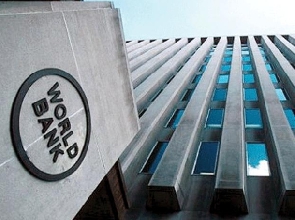The World Bank projects Egypt’s real GDP per capita growth to record 1.7 percent in 2020, down from 3.7 percent in 2019, and to continue its downturn to reach 0.6 percent in 2021.
The World Bank (WB) has upgraded Egypt’s real GDP growth forecast to 3.5 percent, up from two percent forecast in April, but down from 5.6 percent attained in 2019.
Growth is projected to contract to 2.3 percent in 2021, and to bounce back to reach 5.8 percent in 2022.
The revised forecast came in the World Bank’s latest report, released Monday, on economic outlook in the Middle East and North Africa region (MENA).
Egypt's real GDP per capita growth is projected to record 1.7 percent in 2020, down from 3.7 percent in 2019, and to continue its downturn to reach 0.6 percent in 2021 and to rebound in 2022 to reach 4.1 percent, according to the report.
For the country’s current account balance to GDP ratio, the WB expects it to contract to -4.1 percent in 2020, declining by -0.4 percent forecast in April, and to rebound to 4.4 percent in 2021, but to decline again in 2022 to record 3.3 percent, according to the report.
The report also projected Egypt’s fiscal balance to GDP ratio is expected to decline to 8.2 percent, the same forecast in April, and 8.4 percent and 6.9 percent in 2020, 2021 and 2022 respectively.
Concerning poverty levels amid the pandemic, the report expected Egypt to be the second highest in poverty levels after Iraq, with an increase during 2020 to reach 30.5 percent, up from 24.1 percent forecast before the Covid-19 crisis, on a $3.20 basis per headcount.
Yet, on headcount at $5.50, the report upgraded the level to reach 73.8 percent, up from 68.9 percent projected pre-Covid-19 — the highest in the region.
In this regard, the report highlighted Egypt’s Takaful and Karama programme that has benefitted nine percent of households, expanded since the outbreak of the pandemic.
Cash transfers are reasonably well targeted in Egypt, and much larger fractions of the poorest households received them. Nonetheless, a large share of cash transfers leak to better-off households, the report said. And, more importantly, most of the poorest households are not reached.
For MENA, the region’s economies are projected to contract by 5.2 percent in 2020, which is 4.1 percent below the forecast in April 2020, and 7.8 percent worse than that of October 2019, reflecting increased pessimism on regional economy amid the ongoing Covid-19 crisis, according to the report.
The WB said that the Covid-19 pandemic and the collapse in oil prices has affected all aspects of economies in the region, expecting the region to recover only partially in 2021.
The outlook for MENA’s current account and fiscal balances also deteriorated sharply, as current account and fiscal balances in 2020 are forecast at -4.8 percent and -10.1 percent of GDP respectively, much worse than forecasts in October 2019, driven by lower oil export revenue, a drop in fiscal revenue, and the large increase in fiscal expenditure required to respond to the health crisis, according to the report.
Moreover, public debt is projected to rise significantly in the next few years, from about 45 percent of GDP in 2019 to 58 percent in 2022, according to the report.
MENA economic activities are stabilising, but at much lower levels than those observed in December 2019, according to the report.
In this regard, Purchasing Managers’ Indices (PMI) for MENA countries show sharp contractions in March and April of 2020, but stabilised by July, when the indices for Egypt, Saudi Arabia and the UAE were recorded at about 50, indicating no contraction from June.
The dual shock is expected to lower oil prices, which will hurt both MENA exporters indirectly, and importers directly, from reduced foreign direct investment, remittances, tourism, and official assistance to exporters, according to the report.
Remittances from Gulf Cooperation Council (GCC) countries have been substantial in many MENA countries. In addition, official development assistance (ODA) from the GCC is critical for many developing MENA countries, said the report.
Yet, the report warned that lower oil prices could threaten the sustainability of remittances, investment, and aid flows from the GCC, expecting remittances to drop by 20 percent in 2020.
- BoG expects flexibility in IMF programme amid changing economic dynamics
- Ghana's debt revamp snag just a hiccup - Finance Minister
- IMF mission okays US$360 million for Board's approval for Ghana
- Ghana fails to reach agreement on debt deal with two international bondholders – Report
- IMF lauds Ghana's cocoa and energy sector reforms
- Read all related articles













